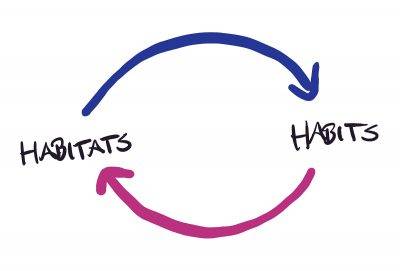
Environmental Forces and the Flow
5th Aug 2021“Priority is a function of context”
Steven Covey
I used to scuba dive. If you’ve ever done it, you’ll know the peace and tranquillity you feel when you sink beneath the surface into another world. It’s quite amazing.
That underwater world forces you to slow down. Compared to being on dry land, surrounded by air, the water’s higher density means you can’t move as fast. You move more slowly and gently. If you try to force yourself to swim faster, you’ll burn through the air in your tank. Then the fun’s over pretty quickly.
Habitats Shape Habits
I reckon scuba diving is a good analogy for thinking about working and living in a more unhurried way. Our environment plays a huge part in shaping how hurried we feel. If our environment, or culture, has a set-point of ‘busyness rules’, that’s how we’ll usually end up working. And if our environment encourages unhurried productivity, that’s how we’ll roll. Habitats shape habits.
When we’re in sync with our environment, there’s less friction and more flow. That’s true if the environment is fast or slow. If we can get in sync with a fast environment, and we have the strategies to sustain it over time, that can be exhilarating! In my 20’s, I worked in the fast-paced world of recruitment in London. I had energy to burn and I loved it.

The challenge comes when the way we need or want to work is at odds with the set-point of the culture. We can try to change the pace through sheer willpower. That’s a tall order. Environmental forces will overcome willpower pretty much every time. And we’ll eventually run out of air. And we’re seeing a lot of empty air tanks lying around with the rise in burnout figures these days.
Here’s the thing. We’re not built to work at pace all the time. Yet increasingly, I see organisational cultures where ‘hurried productivity’ is the norm. Yes, we need to step it up from time-to-time. Yet it’s not sustainable for that to be the set-point. And most senior leaders I’m talking to know that to be the case. They just don’t know what to do about it.
Habits Shape Habitats
This is no small topic and I’m not one to provide simple answers to complex problems. Yet it seems to me that there are a few habits of those who successfully work with their cultures to create flow states more often:
- They know what’s most important over the long term, and relentlessly focus their own and others’ efforts solely on that
- They say no to the other stuff, without apology
- They have a highly attuned sense of how they set the tone for others, and adapt their behaviour and language to shape the environment for sustained, unhurried productivity. Leaders bring the weather, as they say.
Use the Force
While we might not be able to completely change the environment we’re in, we can find flow within it. From a place of flow, we’re better placed to work with the forces at play to shape things. It starts with you. What helps me find the flow is to have a band of fellow travellers around me to keep me focused, keep me real and keep me moving. That’s why I created Change Makers Kick Start. If you’re ready to stop the strive, and find the flow, this five-week online intensive is for you. Check out the details below.
- Some questions to ponder as you go into your day:
- How does the culture I’m in shape my sense of busyness?
- How do I contribute to that?
- If I want the pace to be different, what choices do I have?
- How can your habits shape the habitat?
- What might I experiment with?
Like this post? When you’re ready, here are three ways I can help you further:
- Sign up to my ‘Thinking from the Edge’ newsletter to get tips, insights and early release information that I don’t share on the usual social channels. Delivered weekly to your inbox.
- Get my book, Change Makers: How to make your mark with more impact and less drama. It’s available here.
- Check out Change Makers Co-Lab – an online course + community to help you make your mark with more impact and less drama.

